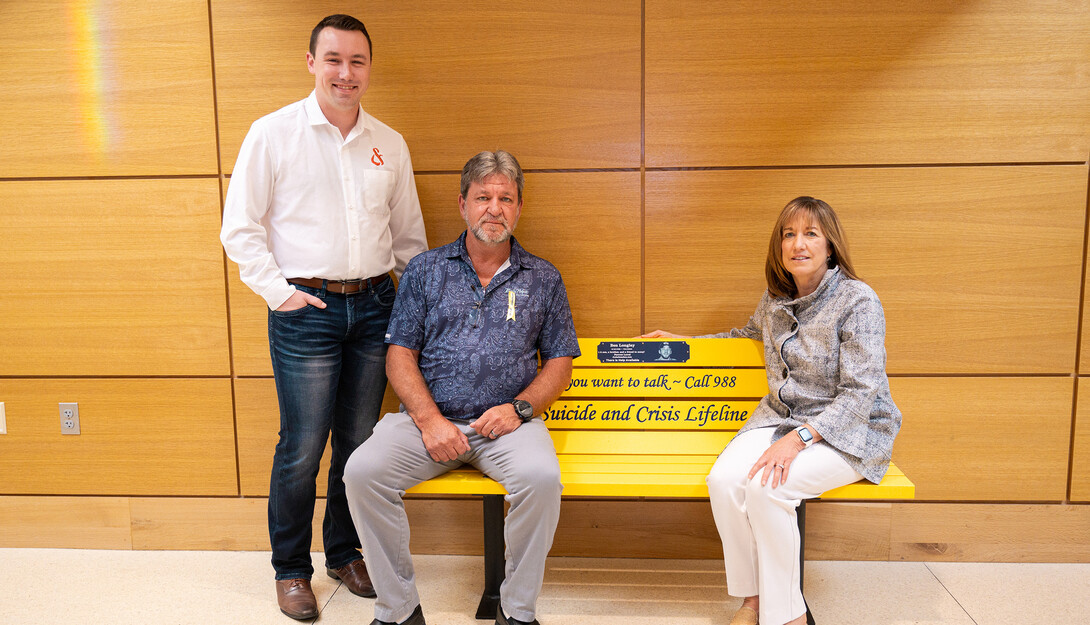
Content note — This story talks about suicide. If you or someone you know needs help, contact Counseling and Psychological Services at the university, which provides students with free services such as therapy sessions, at 402-472-7450. The national Suicide and Crisis Lifeline number is 988.
Leigh-Ann and Paul Longley’s worst nightmare became reality on July 21, 2020. Their youngest child and only son, Benjamin, took his own life at the age of 22.
“Life as we knew it would never again be normal,” Leigh-Ann said. “Ben was kind, funny, loyal, handsome and intelligent. He was one of a large group of young men who had been friends since middle school at O’Gorman in Sioux Falls, South Dakota. Ben had a genuine love of life, and his spare time was always full of different experiences shared with his buddies. He was by no means perfect; however, he was the perfect son for us.”
The Longleys donated a yellow bench from Josh’s Benches for Awareness in honor of their son to the University of Nebraska–Lincoln College of Business this fall. Students, faculty and staff attended the unveiling in Howard L. Hawks Hall on Sept. 26.
Ben started at the University of Nebraska–Lincoln in August 2016, earning a four-year scholarship based on his academic achievements. School had always been easy for Ben, and for two-and-a-half years, everything appeared on track. Leigh-Ann shared how the only change had been a misdiagnosis of attention-deficit hyperactivity disorder in 2018 and the introduction of two different medications to assist with focus.
“The university was everything he had imagined it would be. He received an internship offer in Omaha for the summer of 2019 after his junior year,” Leigh-Ann said.
“On April 6, 2019, Ben arrived home at 5:30 a.m. He had driven from Lincoln back to Sioux Falls, and my husband and I knew something was wrong the moment we saw him. Our son was standing in front of us, yet it was not our Ben. This young man was afraid, questioning everything he had done in life and whether knowledge was good or evil. From this day forward, Ben’s life became a struggle,” Leigh-Ann said.
The Longleys sought help from professionals, meeting with counselors, doctors and psychiatrists.
“Together with our son, we listened as one psychiatrist diagnosed Ben as schizophrenic after a 15-minute appointment,” Leigh-Ann said. “His life moving forward was described in the following terms: homeless — he would live under a bridge, and his parents should never waste money on getting him an apartment; friendless — his friends would all leave as they would not want to be around him; never have a relationship — people with schizophrenia don’t know how to have a relationship; give up on any internship — perhaps it would be better to mow lawns for a living; and sexuality — people would call him names. How does one have any hope after such a bleak and hopeless diagnosis? On top of this, adding medication after medication.”
The Longleys knew something needed to be done to change the narrative and stigma that surround people who struggle with brain illnesses, which in turn leads some to complete suicide.
“We developed a foundation in memory of our son and, through it, became part of a family of suicide survivors. Parents grieving the loss of a child have some degree of understanding of one another’s pain, and we stand together in bringing awareness to the pandemic of suicide deaths,” Leigh-Ann said.
One of the foundations the Longleys began to support was Josh’s Benches for Awareness, founded by Cindy Nadelbach, whose son died by suicide. The nonprofit works with schools and organizations nationwide to help spread awareness about mental health and the services available for help. Every bench donated is painted bright yellow as a sign of hope and includes the national suicide prevention phone number.
“Ben absolutely loved being at the university, so it was never a question of if we wanted to place a bench at the College of Business. It was whether the university would allow it. You see, many places are afraid to talk openly about brain illness and suicide,” she said.
When the Longleys found out their request to donate a bench in memory of Ben had been approved, they shared how they shed tears of appreciation.
“Our hope is Ben’s story will help others who may find themselves in an unfamiliar and frightening frame of mind, to ask for help,” Leigh-Ann said. “If one life can be saved and one family spared the life-changing pain of losing a child, we know the narrative and stigma is shifting in a positive direction.”
The Longleys shared how open and honest conversations about mental health and suicide make change possible.
“Dean Kathy Farrell stood by our family since the onset of Ben’s illness. Now knowing others at Nebraska join in her understanding of this complex disease and share compassion and grace means so much to us,” Leigh-Ann said. “It is our hope this bench will give students and faculty a place to reflect, a message of knowing help is available and reminding people how much they are loved.”







